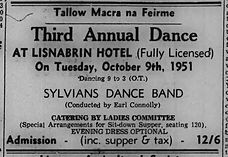

The Crokers of Lisnabrin
Lisnabrin is near the village of Curraglass, which is close to the post town of Tallow, County Waterford.Lisnabrin itself, however, is in the County of Cork. It formed part of the estate given to Sir Walter Raleigh, having originally belonged to the Desmonds. A branch of the Coppingers had, from remote times, lived at Lisnabrin, and when Sir Walter Raleigh acquired the estate, in 1586, he secured the Coppingers in the lands of Lisnabrin under a lease for 4,000 years at the rent of 4d. per acre. Raleigh stood sponsor to the son of Mr. Coppinger, the son being called Walter. Mr. Coppinger, Walter's father, was living at Lisnabrin, with his son and two daughters, at the time that Hugh Croker first came to Ireland. Hugh was a son of Thomas Croker of Trevillas, in Cornwall, second son of the 8th John Croker of Lineham, Co. Devon, and with his brothers migrated to Ireland. They were all probably soldiers. Hugh served under Essex, and it was during the retreat of the English from Limerick towards Waterford, that a battle was fought between the English and Irish, called Tallow.
Essex had fought two battles after leaving Limerick, one between Adare and Askeaton, and another between Askeaton and Croom, and in both had suffered considerably. He had rested for three days at Killmallock, whence he proceeded towards Fermoy, and then as if his intention in taking this route were merely to deceive his enemies and escape their pursuit, he suddenly changed his course and hurried to Lismore, in the County of Waterford. It was not till he reached this place that the Geraldine forces ceased their pursuit, and the English army took some repose after its fatigues and sufferings. He was attacked by the rebels near Tallow, at a village called Conna, and a severe engagement fought. In this engagement Coppinger took no part, though when it was over he and his servants went down to the field of battle to assist and relieve the wounded. Amongst the wounded they discovered a young English officer - he could not have been more than twenty - who was badly hurt and had been left to his fate on the field. Mr. Coppinger immediately ordered him to be conveyed to his own house, at Lisnabrin, where he was most assiduously nursed by Mr. Coppinger's two daughters.
For a long time it was doubtful whether he could be brought round, but care and good nursing effected a cure. During this critical time he, of course, saw much of Lucretia, Mr. Coppinger's youngest daughter, and a strong attachment seems to have grown up between them - so strong that Hugh Croker, for so was the officer called, could not make his departure before he sought of Mr. Coppinger the hand of his daughter in marriage. Coppinger would not hear of it. In the first place, he said he must have his eldest daughter settled in life, and in the second place he could never consent to having a Protestant son-in-law. Sorrowfully young Croker departed, but determined to bring the weight of his interest with the Government to bear upon the obdurate father. He proceeded to London, and the next year, 1600, obtained a grant of Lisnabrin as a reward of his services during the war. He forthwith returned to Ireland, and was received at Lisnabrin as a welcome visitor.
Day after day passed before he could bring himself to tell his friend Coppinger that he was in reality the owner of the property of his former preserver. At length one day Coppinger remarked to him how curious it was that he alone of all his neighbours had escaped confiscastion.Croker then told him all, but added, "None need depart if you will allow me to marry your daughter Lucretia." To this arrangement Coppinger ultimately consented, and thus Hugh Croker and Lucretia Coppinger became the ancestors of the Crokers of Lisnabrin.

